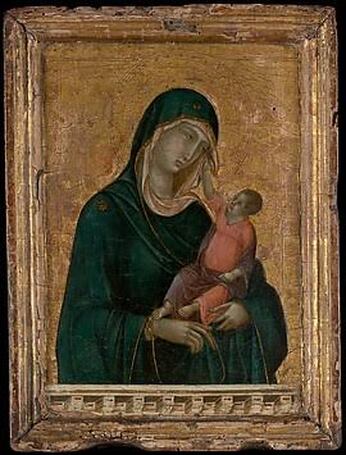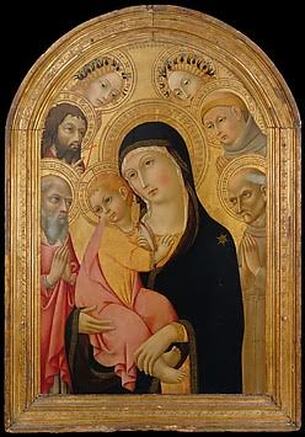|
The Sacred Family In nearly every museum in Europe, there hangs a painting of a mother, with her child perched upon her lap. A mother and her child flanked by bodiless winged cherubs. Perhaps consulting the Bible. Swaddled in headscarf and robes. Sometimes the child resembles a shriveled old man, other times the limbs are too long for the body. The mother appears serene, save for a crimp of worry, perhaps for the child’s fate as the Chosen One, or not even as the chosen one, but because this child who comes into the world, skeptical and squalling, is hers. Sometimes halos in pure gold gilt or wispy rings hover like cake plates behind their heads; other times, nothing. Sometimes the artist gilds the backdrop in solids, other times it’s mountains and trees and fields. Sometimes Mary is flanked by scores of men, presumably the saints, inside the walls of an elegant palace, her heaven on earth depicted in opulent fabric, even though she supposedly gave birth in a manger. How many generations of ordinary women have sat as Mary, humble and regal? How many children have sat, unbeknownst to them, as the Son of God, as a careful eye turned their wriggling forms into art? Like so many before me, I was once cast as a Mary. I did not pose for a painting, but rather found myself as an unwilling Madonna shuffling across the church in my mother’s bathrobe on Christmas Eve. Mum’s was the gold star threat of holiday threats that began, as all threats do during that time of year, with “Santa’s not going to come unless...” unless I answered the priest’s call to play a last-minute Mary because the girl they picked first, Carmella Hinojosa, was sick. What else could I do? I hated crowds, but I wanted Santa’s presents. Under mum’s powder blue terry, and shepherded by Joseph, I carried a plastic babydoll wrapped in a king-sized sheet, our heads draped with towels like nuns’ veils. The trees—my catechism classmates in brown plastic trash bags holding swaths of pine branches—went “swish swish,” as we searched for a place to have the Baby Jesus. And I tried to be a good Mary but with my red patent shoes gleaming I knew I was no Galilean virgin, but rather, a child of the 80’s who certainly was not destined to be the mother of a Chosen Child. And yet, as the spotlight followed me past the throngs of packed pews, toward the innkeeper’s stall—in actuality, one of the confessionals—I couldn’t help but think about the fate of the Chosen baby, of the first Mary, of all the people who were mean to her and forced her into the barn in the first place. And with the spotlight trailing me, I stopped, even as the beam, to its credit, attempted to guide me toward my final destination. In that moment, Harold Jameson, the “good” innkeeper, perked up, and opened the cavern we were expected to enter—the confessional manger barn where Mary, symbolically, has the baby—and even though the whole congregation waited on me to enter the manger, I simply couldn’t. It was Christmas Eve, 1988, and for the people of Hobart, Connecticut, baby Jesus was not born that night. He was not born there because I fled the church, tripping over my robe, clutching the plastic baby to my belly, out into the wintery night. Outside, the air was cool enough to see my breath and every corner of the church glowed in strings of golden lights. To heck with Santa’s presents. Baby Jesus, I believed, needed me not to share him with the rest of the world. He needed me to be his mother. On the stone steps under those glowing lights, I pulled him out of the king-sized sheet and held him on my lap, cradled him in my arms, studying him with all wonder and care due of a new mother: would he be okay? Would he survive? Could I protect him? Until my own mother burst out the parish doors, arms akimbo and mad as hell. In case you’re wondering, Santa did come for me that year. A rainbow legwarmer set and a baby doll not unlike the one I fled with, fluttering eyes and all, appeared the next morning under the tree. The priest decided I was too much of a renegade to finish the pageant, and it went on without me. That night at Christmas dinner, Mum told everyone how the priest emerged from his throne, scooped up a real one-month old baby, and presented it to the parish, high above his head, to applause, and held the sleeping child on his chest throughout the homily, giving each parishioner hope that maybe this child would turn out all right, even if the one they chose to play Mary that year did not. I decided I didn’t care. I’d been Chosen too, for once, and realized it was not for me. So I study these paintings of the woman and her child, Madonna with Christ. Mother with child. Mary and Jesus. Alone, Mary is just a woman. Alone, the child is just a child. Sometimes a man—Joseph, we presume—emerges on the canvas, making the family, by some accounts, whole, sacred, together. But I gravitate to the paintings where it’s just the two of them, alone together on a wood-backed canvas or stone tablet, once destined to grace a small ornate parish on an Italian hillside, creating something bigger and more precious, alone together. But enough about my obsessions, for that is what these paintings are. Maybe it’s not even an obsession, but rather the byproduct of how I spend most of my time, away from my own mother, seated in a scratchy blue uniform before a wall of a dozen gilded Madonnas, hoping no one will force me to scold them for getting too close to the art. Erica Plouffe Lazure Erica Plouffe Lazure is the author of a flash fiction chapbook, Heard Around Town, and a fiction chapbook, Dry Dock. Sugar Mountain, a flash fiction chapbook, is forthcoming by Ad Hoc Press (UK) in Fall 2020. Her fiction is published in McSweeney's Quarterly Concern, Carve, Greensboro Review, Meridian, American Short Fiction, The Journal of Micro Literature, The Southeast Review, Phoebe, Fiction Southeast, Flash: the International Short-Short Story Magazine (UK), Hippocampus Magazine, Litro (UK), and elsewhere. She lives and teaches in Exeter, NH and can be found online at ericaplouffelazure.com.
0 Comments
Your comment will be posted after it is approved.
Leave a Reply. |
The Ekphrastic Review
COOKIES/PRIVACY
This site uses cookies to deliver your best navigation experience this time and next. Continuing here means you consent to cookies. Thank you. Join us on Facebook:
July 2024
|





